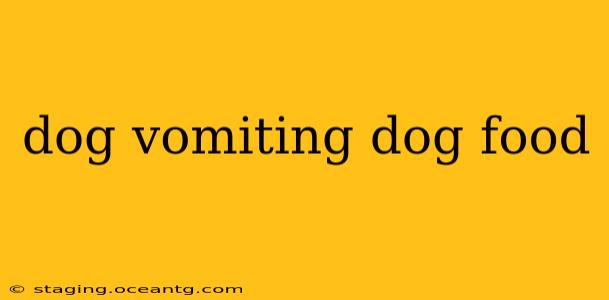It's distressing to see your furry friend vomiting, especially if it's their own food. Dog vomiting dog food is a common issue, but understanding the underlying causes is crucial for ensuring your dog's health and well-being. This comprehensive guide explores the reasons behind this problem, preventative measures, and when professional veterinary attention is necessary.
Why is My Dog Vomiting Up Dog Food?
Several factors can contribute to a dog vomiting their food. These range from relatively minor issues to more serious medical conditions. Let's explore some of the most common culprits:
-
Eating too quickly: Many dogs gobble their food down without properly chewing, leading to indigestion and subsequent vomiting. This is especially prevalent in multi-dog households where competition for food is high.
-
Dietary indiscretion: This includes eating something outside of their regular diet, such as spoiled food, garbage, or non-food items. Even seemingly harmless things can upset a dog's stomach.
-
Food allergies or intolerances: Certain ingredients in commercial dog food can trigger allergic reactions or intolerances, resulting in vomiting. Common culprits include wheat, corn, soy, and dairy.
-
Inflammatory bowel disease (IBD): IBD is a chronic condition causing inflammation in the digestive tract, leading to symptoms like vomiting, diarrhea, and weight loss.
-
Pancreatitis: Inflammation of the pancreas can also cause vomiting, often alongside other symptoms like abdominal pain and lethargy.
-
Parasites: Intestinal parasites like worms can irritate the digestive system, resulting in vomiting and other gastrointestinal issues.
-
Infections: Viral or bacterial infections can affect the digestive system, leading to vomiting and other symptoms.
-
Motion sickness: Dogs prone to motion sickness may vomit after car rides or other forms of travel.
-
Stress or anxiety: Changes in routine, new environments, or stressful situations can upset a dog's stomach.
What Should I Do If My Dog Vomits Dog Food?
The immediate action depends on the severity and frequency of the vomiting. If your dog vomits once or twice and seems otherwise healthy – playful, eating and drinking normally – observe them closely. Withhold food for a few hours, then offer small amounts of bland food like boiled chicken and rice.
However, if the vomiting is persistent, frequent, or accompanied by other symptoms like lethargy, diarrhea, loss of appetite, fever, or blood in the vomit, contact your veterinarian immediately. These could indicate a more serious underlying health problem.
How Can I Prevent My Dog From Vomiting Dog Food?
Prevention is key to avoiding this distressing situation. Here are some helpful strategies:
-
Feed smaller, more frequent meals: Instead of one large meal, divide the food into several smaller portions throughout the day. This reduces the likelihood of overeating and allows for better digestion.
-
Use a slow-feed bowl: Slow-feed bowls are designed to slow down a dog's eating pace, reducing the risk of vomiting due to rapid consumption.
-
Ensure food quality: Choose high-quality dog food that is appropriate for your dog's age, breed, and size. Consider options with limited ingredients to minimize potential allergens.
-
Avoid table scraps: Table scraps are often unhealthy and can upset your dog's stomach.
-
Supervise your dog: Prevent your dog from scavenging for food outside or from eating garbage.
-
Regular veterinary check-ups: Regular check-ups allow your veterinarian to identify potential issues early on and provide necessary preventative care.
Is My Dog Vomiting Because of a Food Allergy?
Food allergies can manifest in various ways, including vomiting. If you suspect a food allergy, keeping a detailed food diary can be beneficial. Note any changes in diet, and correlate these with any instances of vomiting. Your vet can perform allergy testing to identify the specific allergen. Often, a trial of a hypoallergenic diet can help determine the cause.
My Dog Keeps Vomiting After Eating – What Could It Be?
Persistent vomiting after eating warrants a visit to the veterinarian. It may indicate a more serious underlying medical condition, such as IBD, pancreatitis, or even a blockage. Delaying veterinary care can lead to more significant health complications.
When Should I Take My Dog to the Vet for Vomiting?
Consult your veterinarian immediately if your dog is vomiting frequently, the vomit contains blood, your dog shows signs of dehydration (loss of skin elasticity, dry gums), exhibits lethargy, experiences loss of appetite, or has a fever. These are all significant warning signs that require prompt professional attention.
By understanding the potential causes of dog vomiting dog food and taking proactive measures, you can significantly reduce the likelihood of this occurring and ensure your canine companion's health and happiness. Remember, always consult your veterinarian for any concerns regarding your dog's health.
